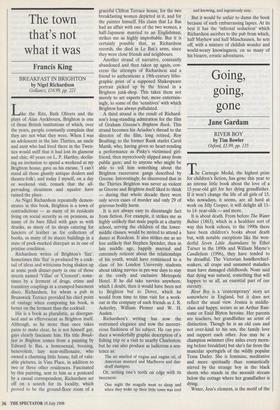The town that's not what it was
Francis King
BREAKFAST IN BRIGHTON by Nigel Richardson Gollancz, £16.99, pp. 221 Like the Ritz, Bath Olivers and the plays of Alan Ayckboum, Brighton is one of those British institutions of which, over the years, people constantly complain that they are not what they were. When I was an adolescent in the late Thirties, an uncle and aunt who had lived there in the Twen- ties would sniff that it had lost its glamour and chic; 40 years on L. P. Hartley, declin- ing an invitation to spend a weekend at my Brighton house, gave as his excuse, 'I can't stand all those ghastly antique dealers and theatre-folk'; and today I myself, on a day or weekend visit, remark that the all- pervading sleaziness and squalor have ruined the place.
As Nigel Richardson repeatedly demon- strates in this book, Brighton is a town of contradictions — as many of its residents living on social security as on pensions, as many of its bars filled with gays as with drunks, as many of its shops catering for fanciers of leather as for collectors of books, as many of its stucco buildings in a state of pock-marked disrepair as in one of pristine condition.
Richardson writes of Brighton's 'fizz'. Sometimes this 'fizz' is produced by a cock- tail of ideas and witticisms being shaken up at some posh dinner-party in one of those streets named 'Villas' or 'Crescent'; some- times by a ferment of drugs, crime and transitory couplings in a cramped basement disco. Richardson, for whom a pub in Brunswick Terrace provided his chief point of vantage when composing his book, is better on the ferment than the cocktail.
His is a book as pluralistic, as disorgan- ised and as effervescent as Brighton itself. Although, as he more than once takes pains to make clear, he is not himself gay, gays clearly fascinate him. His title Break- fast in Brighton comes from a painting by Edward le Bas, a homosexual, boozing, benevolent, lazy near-millionaire, who owned a charming little house, full of valu- able pictures, in Vine Place, in addition to two or three other residences. Fascinated by this painting, sent to him as a postcard by a casual correspondent, Richardson set off on a search for its locality, which proved to be the ground-floor room of a graceful Clifton Terrace house, for the two breakfasting women depicted in it, and for the painter himself. His claim that Le Bas had an affair with one of the two women, a half-Japanese married to an Englishman, strikes me as highly improbable. But it is certainly possible that, as Richardson records, she died in Le Bas's arms, since they were close friends and neighbours.
Another strand of narrative, constantly abandoned and then taken up again, con- cerns the attempts of Richardson and a friend to authenticate a 19th-century litho- graphic print of a supposed Shakespeare portrait picked up by the friend in a Brighton junk-shop. This takes them not merely to art experts but, more entertain- ingly, to some of the `sensitives' with which Brighton has always pullulated.
A third strand is the result of Richard- son's long-standing admiration for the film of Graham Greene's Brighton Rock. This strand becomes his Ariadne's thread to the director of the film, long retired, Roy Boulting; to the former Rank starlet Carol Marsh, who, having given so heart-rending a performance as Pinky's victimised girl- friend, then mysteriously slipped away from public gaze; and to anyone who might be able to tell him something about the Brighton racecourse gangs described by Greene. Interestingly, he discovered that in the Thirties Brighton was never as violent as Greene and Brighton itself liked to think — during that whole decade there were only seven cases of murder and only 29 of grievous bodily harm.
It is not always easy to disentangle fact from fiction. For example, it strikes me as highly unlikely that male pupils at a charity school, serving the children of the lower- middle classes, would be invited to attend a dance at Roedean. It also strikes me as no less unlikely that Stephen Spender, then in late middle age, happily married and extremely reticent about the relationships of his youth, would have reminisced to a class of his London University students about taking navvies in pre-war days to stay at the costly and exclusive Metropole Hotel. If he did take navvies anywhere, which I doubt, then it would have been not to Brighton but to Dover, which he would from time to time visit for a work- out in the company of such friends as J. R. Ackerley, William Plomer and W. H. Auden.
Richardson's writing has now the restrained elegance and now the meretri- cious flashiness of his subject. He can pro- duce a wonderfully graphic description of a fishing trip or a visit to nearby Charleston; but he can also produce as ludicrous a sen- tence as:
The air smelled of virgins and engine oil, of American mustard and Marlboros and dan- druff shampoo.
Or, setting one's teeth on edge with its tweeness:
One night the seagulls went to sleep and when they woke up their little town was cool and knowing, and ingeniously sexy.
But it would be unfair to damn the book because of such embarrassing lapses. At its best it has the 'infernal seduction' which Richardson ascribes to the pub from which, half Mayhew and half Miinchausen, he sets off, with a mixture of childish wonder and world-weary knowingness, on so many of his bizarre, erratic adventures.


























































 Previous page
Previous page